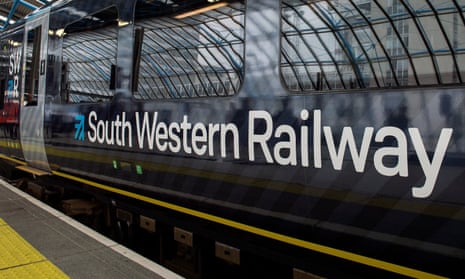The South Western Railway franchise is “not sustainable” and could be nationalised, the transport secretary has said.
Grant Shapps’s warning, which comes as the rail franchising system looks likely to be ripped up and redrawn, follows a period of poor financial performance for SWR, a joint venture between FirstGroup and the Hong Kong firm MTR. Shapps said options for the franchise included nationalisation or the issuing of a new contract to SWR’s operators.
Filings at Companies House published earlier this month showed the business lost £137m in the year to March 2019 and was in danger of going bust before the end of this year.
The franchise has been beset by poor punctuality and reliability, combined with slower-than-expected revenue growth and a wave of strikes in a dispute over the use of guards on trains. In a written statement to parliament, Shapps said the company’s recent financial statements indicated that the franchise, which began in August 2017 and stretches from London to the Surrey commuter belt, Bournemouth and Exeter, “is not sustainable in the long term”.
SWR has not yet failed to meet its financial commitments, said Shapps but the Department for Transport “must prepare suitable contingency measures”, including handing the route over to the state-owned operator of last resort.
Earlier this month, Shapps began the process of nationalising the Northern rail franchise, two years after the government took control of the east coast mainline.
Industry figures show that, between 8 December and 4 January, the proportion of scheduled train stops made within a minute of the timetable by SWR was 55%, compared with the average across Britain of 62%.
Members of the Rail, Maritime and Transport (RMT) union on SWR have staged a series of strikes stretching back more than two years in a dispute over the role of guards, which has caused severe disruption for passengers.
The latest strikes lasted throughout December and into New Year’s Day, leading to cancellations and delays. The RMT has recently launched a fresh ballot of members on continuing industrial action.
Shapps said in the statement that the strikes are “not about safety, accessibility or helping passengers” and insisted: “Driver-controlled trains are perfectly safe. These trains allow the guards to devote much more time to looking after passengers.”
The RMT’s general secretary, Mick Cash, said: “This government is acting like a puppet for the rail companies, throwing good public money after bad and trying to breathe life into the rotting corpse of privatised rail.
“Instead of dreaming up new ways to subsidise private-sector profits by attacking civil liberties, he [Grant Shapps] should stop pushing cost-cutting driver-only operation and bring SWR into public ownership, running it in the interests of passengers and workers, not his mates in the City.”
The government-commissioned Williams review into the future of the rail industry is due to report soon and the review’s chairman, the former British Airways boss Keith Williams, has already said franchising no longer works in its current form.
SWR and Northern’s troubles are being staged against the backdrop of a lawsuit launched by the train operator Stagecoach, alongside Virgin Trains and France’s state-backed SNCF. The high court case could force the government to pay tens of millions of pounds in compensation and cancel two franchises.
The train companies claim they were improperly disqualified from rail franchise bids because the government expected them to take on an unrealistic amount of financial risk relating to the railways pension scheme.
